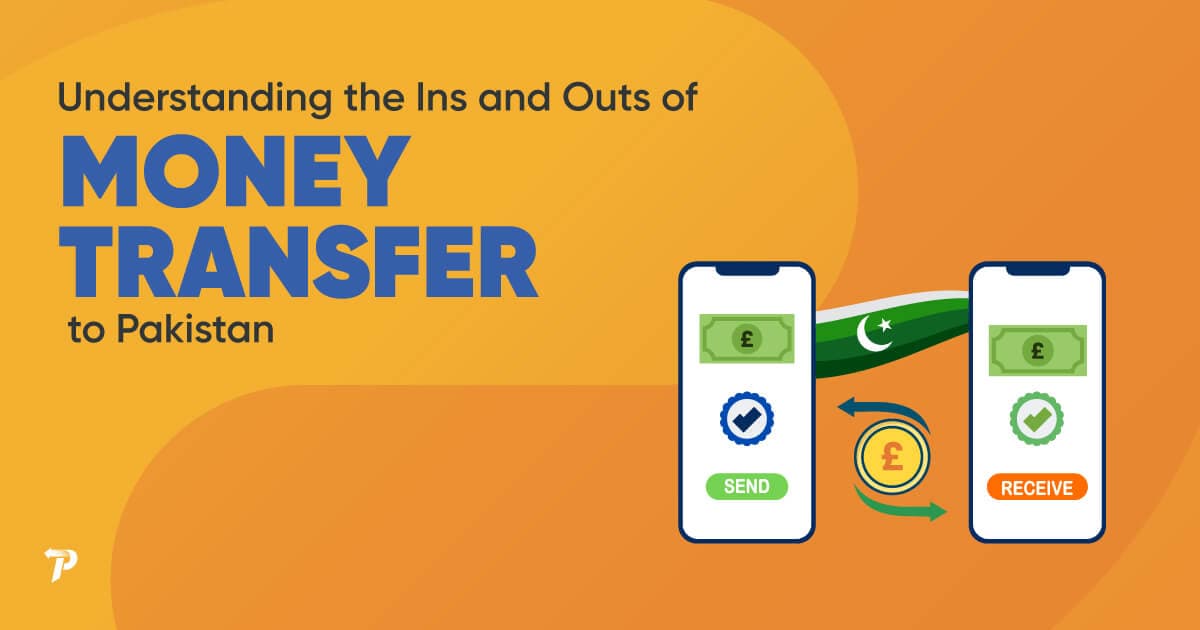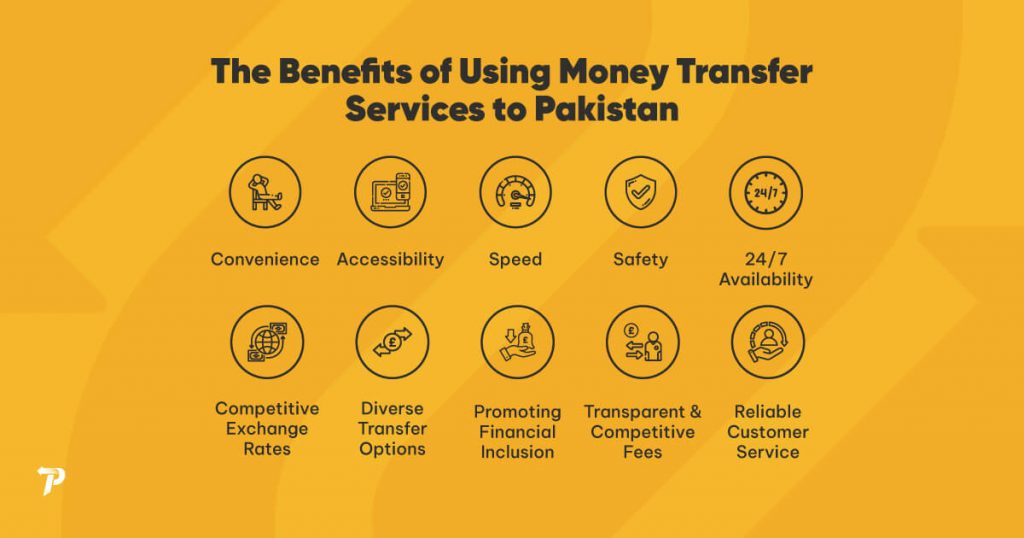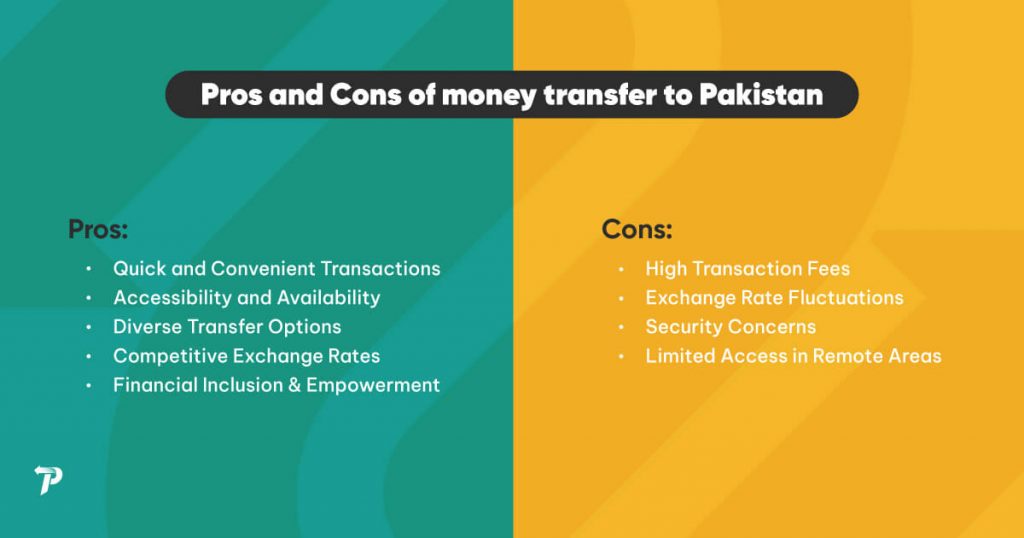
Understanding the Ins and Outs of Money Transfer to Pakistan
Money transfer is an essential cog in the wheel of modern finance. It’s the process of moving funds from one person or entity to another, crossing geographical, economic, and technological borders. In today’s interconnected world, money transfer powers businesses, supports families and connects economies.
Whether it’s a migrant worker sending earnings home, a parent funding a child’s education abroad, or a business paying for international services, money transfers play a pivotal role. They bridge distances, fuel economies, and foster global relationships.
Money transfers are not just transactions; they’re lifelines that bind the global village together.
The Benefits of Using Money Transfer Services to Pakistan

Convenience:
These services simplify the process of sending money to Pakistan. With online access, you can initiate transfers from the comfort of your home, avoiding the complexities of traditional money-sending methods.
Accessibility:
Cash pickup services in Pakistan are highly accessible. Recipients can collect cash within minutes at designated locations, making it ideal for those without bank accounts or access to other financial services.
Speed:
Time is often critical in money transfers. Cash pickup services excel in providing swift transactions, allowing recipients to access funds quickly, which is especially crucial in emergencies.
Safety:
Security is paramount in financial transactions. Cash pickup services prioritize the protection of your funds, employing encryption and other security measures to safeguard personal and financial information.
Competitive Exchange Rates:
These services often offer favorable exchange rates, ensuring that your money converts into the local currency at a better value. This is advantageous for both the sender and the recipient.
24/7 Availability:
The modern world demands flexibility in financial transactions. Cash pickup services operate around the clock, facilitating transfers at any time, which is beneficial for urgent situations or different time zones.
Diverse Transfer Options:
These services provide various methods for sending money, including direct bank transfers, online payment platforms, and credit or debit card options, catering to different preferences and needs.
Promoting Financial Inclusion:
By using cash pickup services, you contribute to enhancing financial inclusion in Pakistan, especially for those who lack access to traditional banking systems.
Transparent and Competitive Fees:
Cash pickup services usually have clear and competitive fee structures, helping you understand the costs involved in your transactions.
Reliable Customer Service:
Should any issues or queries arise, these services offer dependable customer support through dedicated helplines or online chat assistance, ensuring a smooth and efficient transfer process.
Pros and Cons of Money Transfer

Pros of Money Transfer to Pakistan
When choosing a money transfer service for sending funds to Pakistan, it’s important to weigh several factors to ensure that your transaction is not only successful but also meets your specific needs. Here are some key considerations:
Quick and Convenient Transactions
Efficiency:
Look for a service that offers fast and straightforward transactions. Time is often of the essence, especially in urgent situations.
User-Friendly Platforms:
Services with easy-to-navigate interfaces, both online and on mobile apps, can significantly enhance the user experience.
Accessibility and Availability
Wide Reach:
Choose a service that has a broad network in Pakistan, ensuring that your recipient can easily access the funds, irrespective of their location.
24/7 Service:
Services that operate around the clock are crucial for accommodating different time zones and urgent transfer needs.
Diverse Transfer Options
Flexibility:
A service offering multiple transfer methods (bank transfers, cash pickups, mobile wallets) is advantageous, catering to the diverse needs of different users.
Customization:
This flexibility allows you to tailor your transfer method according to the preference and convenience of both sender and recipient.
Competitive Exchange Rates
Maximizing Value:
Services offering competitive rates ensure that your recipient gets more value in the local currency, making your transfer more effective.
Cost-Effectiveness:
It’s important to compare rates among different services to ensure you are getting the best deal.
Financial Inclusion and Empowerment
Supporting Unbanked Populations:
Opt for a service that reaches recipients who may not have traditional banking access, thereby promoting financial inclusion.
Economic Impact:
Money transfers can significantly contribute to the local economy and empower individuals and communities financially.
Cons of Money Transfer to Pakistan
Nothing comes with a price. If there are many advantages, there are also certain drawbacks or limitations which you need to consider while choosing a medium to transfer your money.
High Transaction Fees
Cost Burden:
Some services charge high fees for international transfers, which can significantly reduce the amount the recipient receives.
Varied Fee Structures:
Different services have varied fee structures based on the transfer amount, method, and speed, which can be confusing and costly.
Exchange Rate Fluctuations
Unpredictability:
Exchange rates can fluctuate significantly, affecting the value of the money sent. This can be particularly challenging for regular remittances.
Potential Financial Loss:
If not timed correctly, exchange rate fluctuations can lead to a lower value of the received amount in the local currency.
Security Concerns
Risk of Fraud:
There’s always a risk of scams and fraudulent activities in online financial transactions.
Data Privacy:
There are concerns about the security of personal and financial information, especially with less reputable services.
Limited Access in Remote Areas
Inconvenience for Recipients:
People living in remote or rural areas of Pakistan might find it difficult to access funds, as not all areas are served by cash pickup locations or have banking facilities.
Dependency on Local Infrastructure:
Limited internet access or lack of financial infrastructure can impede the efficient use of online or mobile-based money transfer services.
Additional Considerations
Reliance on Technology:
Online and mobile-based transfers require access to technology and internet connectivity, which might not be available to all segments of the population.
Regulatory Hurdles:
International transfers are subject to various regulations and compliance requirements, which can sometimes slow down the process or complicate transactions.
Customer Service Limitations:
Some services may not offer robust customer support, leading to challenges in resolving issues or getting assistance when needed.
Understanding these cons is vital for anyone considering using money transfer services to Pakistan. It highlights the importance of choosing a reliable and efficient service that balances cost, convenience, security, and accessibility.
Additional Factors to Consider
Security:
Ensure the service has robust security measures to protect your financial and personal information.
Fees and Charges:
Be aware of any hidden fees or additional charges that may apply to your transfer.
Customer Support:
Reliable customer service is crucial for addressing any issues or queries you might have.
Reputation and Reliability:
Research the service’s track record and customer reviews to gauge its reliability and quality of service.
While money transfers to Pakistan offer numerous benefits, there are also several drawbacks that should be considered:
Comparison of different money transfer methods
Comparing different money transfer methods can help you choose the best option based on your specific needs. Here’s a comparison of bank transfers, online money transfer services, and remittance companies:
Bank Transfers
Pros:
- Security: Generally very secure, with banks having robust measures to protect financial transactions.
- Direct Transfer: Funds are transferred directly between bank accounts.
- Global Reach: Most banks can transfer money worldwide.
Cons:
- Higher Fees: Often have higher fees compared to other methods.
- Slower Processing: Transfers can take several days, especially for international transactions.
- Exchange Rate Margins: Banks often add a margin to exchange rates, which can be costly.
Online Money Transfer Services
Pros:
- Convenience: Accessible anytime and anywhere with an internet connection.
- Speed: Transfers are usually faster than bank transfers, often instant or within the same day.
- Competitive Rates: Often offer better exchange rates and lower fees than banks.
Cons:
- Security Concerns: While generally secure, there’s a varying degree of risk depending on the service’s reputation and security measures.
- Transfer Limits: Some services have limits on the amount that can be transferred.
- Reliance on Technology: Requires internet access and understanding of the platform.
Remittance Companies
Pros:
- Specialization in Remittances: Often tailored for migrant workers sending money home, understanding their specific needs.
- Accessibility: Many have physical locations for cash pickup, beneficial for recipients without bank accounts.
- Variety of Delivery Methods: Options often include bank transfers, cash pickups, and mobile money.
Cons:
- Higher Fees for Small Amounts: Can be expensive for transferring small amounts of money.
- Exchange Rate Costs: Some may not offer the most competitive exchange rates.
- Availability: While they have a broad reach, their presence might be limited in certain areas.
The choice between these methods depends on factors like the urgency of the transfer, the amount being sent, the need for physical cash pickup, cost considerations, and the convenience and accessibility for both sender and receiver.